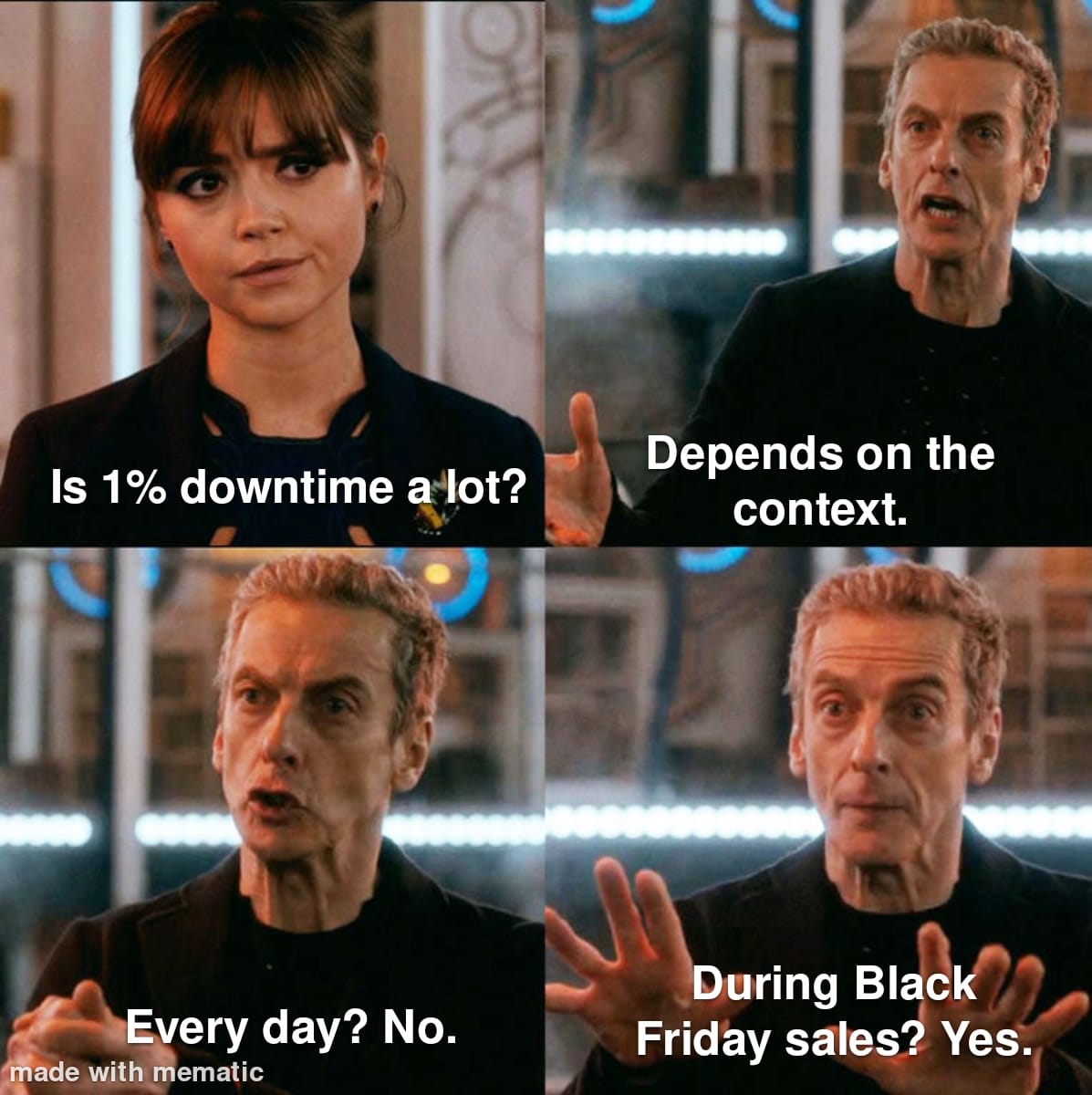Imagine you are running an e-commerce website and you hosting provider guarantees you a 99% uptime. Is it good enough for your business? It depends. If the downtime occurs for 10 minutes every day when it's 3 am on your biggest market timezone, that's not too bad. Vice versa, if your site is not accessible for three days in a row starting from the Black Friday, well, you already know what you have to do.
You can see that in both cases, the the downtime is well below 1% per year (so the hosting provider has maintained its promise) but the effects on your business are radically different. This is what can happen when, for measurement purposes, we want to reduce a complex situation to a mere number.

The Routes That Lead to Your Destination
At the beginning of a new year, it is common to set objectives, both for work and personal life. How do you measure progresses? And how can we say whether we reached the goal or not?
Let's say you decide your new year resolution is to have a more health-conscious life. This represent the destination that can be reached through different routes. So, you might then decide that to reach this goal, you have to go to the gym twice per week and you can eat cakes and drink alcohol only during the weekend. Unlike the resolution, these two steps can be measured: you can easily tell whether you went to the gym or not, right?
But the devil hides in the details. Yes, you can go to the gym twice per week but if you never do cardio or you never train your legs, this route is not so effective as it could be.
With the cake and alcohol restriction, things could go even worse, if every Saturday you get drunk and you gorge yourself on cakes every Sunday. In this case, even if your metric is perfectly on track, you'll never reach the destination.
On the Work
A widely used framework (also by my company, in the past) to set new goals is the S.M.A.R.T. criteria. The acronym stands for: Specific, Measurable, Attainable, Relevant, and Time-related. It has been always difficult for me to deal with the "measurable" part. Let me show you why.
If the objective is to be more collaborative with the colleagues, one metric could be: reply to any internal email within the next (working) day. It seems fair: after all, if I reply timely to every request, I am absolutely the most collaborative guy in the company.
The truth is that this metric can be easily deceived. Example:
• A request comes on Monday morning,
• I reply on Tuesday afternoon right before C.o.B. with "What do you mean?",
• The colleague gives more details on Wednesday morning,
• On Thursday afternoon at C.o.B. I give the solution, and
• The colleague sees it on Friday morning.
One week has passed and, even if I met my measurement criteria, I'm not really collaborative how I should be.
Discipline and the Referee
You should have now understood that the formal respected of the "rules" is not enough. Self-discipline is paramount, because our brain has been shaped by the evolution to be super-good in finding shortcuts. On the other hand, if getting better (in our personal and/or working life) were easy, almost everyone in the world would be an high performer with a fitness body.

It is not easy to decide to ignore shortcuts, to maintain the discipline and to force ourselves into something unpleasant in order to have an outcome some day in the future.
To help you on this, you can have a referee. It could be a friend, a colleague, your partner or a relative that keeps track of the progresses and does the measurement part for you. In every sport, there is someone that ensures that rules are respected and that measures or counts the points.[1] In high jump, the height of the bar is checked by a judge, not by athletes. The same happens for the length of a long jump.
On a work environment, during the 1-on-1 meetings or at the end-of-the-year review, your manager is acting like a judge - and an adviser. Don't see your boss as an enemy: every critic you receive is a suggestion on the areas you should improve.
Conclusions
Setting goals is easy. Choosing a proper metric is complex. Measuring the progress is hard. It's hard because a lot of discipline is needed to avoid cheating. Keep in mind that, to reach your goals, you need to put a lot of duty in the process. As the Goodhart's law states: "When a measure becomes a target, it ceases to be a good measure".
You might argue that sports are generally practiced against one or more opponents, but the reality is that, before being able to beat others, you have to beat (the lazy version of) yourself. Besides, you don't have any control over your opponent; the only thing you can do is to work on yourself. ↩︎
Post last changed on 2023-04-25
Cover image by arielrobin from Pixabay licensed under the Pixabay License
"Depends on the context" meme made by me with Mematic
Animated gif made by me with gifs; source video I Can't Dance by Genesis

